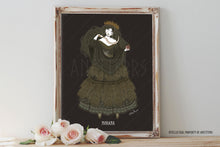

Morana, also known as Marzanna or Morena in various Slavic mythologies, is a goddess associated with death, winter, and the end of the agricultural year. Her mythology is deeply rooted in the seasonal cycles of nature, symbolizing the death that comes with winter and the rebirth that follows in spring. Morana is often depicted as a figure to be both respected and feared, embodying the harshness of winter and its challenges.
Traditionally, rituals involving effigies of Morana were performed at the end of winter to symbolize the departure of the cold season and the welcoming of spring. These effigies, made of straw or other materials, would be paraded through villages and then burned or drowned in rivers. This act was seen as a way to hasten the end of winter and ensure the fertility of the fields in the coming growing season.
Morana’s role as a deity reflects the Slavic people's understanding of the natural world and its cycles, highlighting their reverence for the forces of nature and the transitions between the seasons. Despite her association with death and winter, the rituals surrounding Morana celebrate the cyclical nature of life, death, and rebirth, marking the triumph of spring over winter and life over death.




